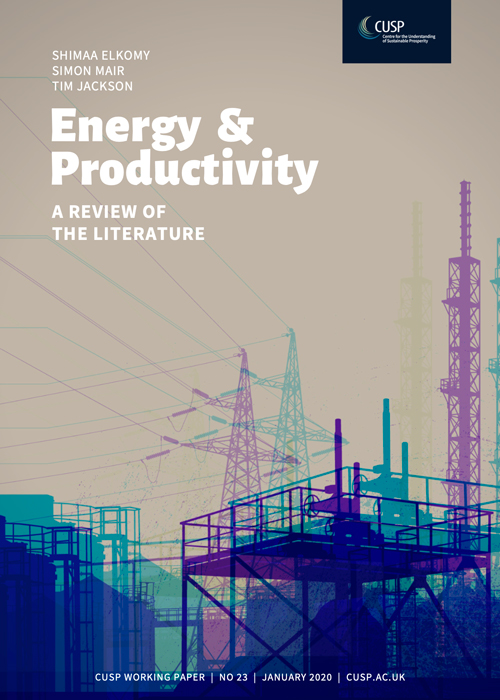The UK is experiencing a period of low productivity growth. Although exacerbated by the financial crisis of 2008, the underlying trend is longer and more persistent. Trend labour productivity growth has been declining since the mid-1960s. Conventional understandings fall short of explaining the reasons behind this decline. The quality and availability of energy has been proposed as one driver of productivity growth. However, the links between energy and productivity are mediated by many factors and the relationship is contested.
This report aims to expand conventional understandings of productivity by exploring the literatures which relate productivity to the availability, production and use of energy in the economy. The report is the result of a survey, a desk-based literature review, and a participatory mapping process (Boehnert et al 2019). We provide an introduction to key theoretical issues regarding productivity analysis and review work on the historical relationship between energy and labour productivity. We then review six channels through which it has been proposed that energy and productivity may be related. They are: 1) Capital; 2) Prices; 3) Energy Consumption; 4) Energy Return on Energy Invested; 5) Economic Structure; and 6) Climate Change. Key findings and research gaps are summarised below.
Key finding 1
There are numerous potential links between energy and productivity.
- Researchers have proposed a variety of links between energy and productivity. Key suggested links include the way that capital uses energy, and the way that economic actors respond to energy prices. There may also be more indirect links, particularly through climate change and the quality of the energy supply. Links often cut across physical and social aspects of economic systems.
Key finding 2
There is insufficient empirical evidence to prove or disprove many of the proposed links.
- While many researchers suggest that energy and productivity are linked, there is relatively little consensus in the empirical literatures either confirming or rejecting these views. In some cases (notably the relationship between capital and energy), we do not appear to have robust methodologies for making empirical assessments.
Key finding 3
Mitigating against the negative impacts of energy use may require transformative change.
Fossil fuel energy use drives climate change, which is itself likely to reduce productivity levels. Reductions in the quality of available energy may also impact productivity in a number of ways. Mitigating these impacts could require transformative changes in the way we use energy, and potentially also a rethinking of productivity growth itself.
Download
 Download full paper (pdf, 5.3MB) | Elkomy S, S Mair and T Jackson 2020. Energy and Productivity—a review of the literature. CUSP Working Paper No 23. Guildford: University of Surrey.
Download full paper (pdf, 5.3MB) | Elkomy S, S Mair and T Jackson 2020. Energy and Productivity—a review of the literature. CUSP Working Paper No 23. Guildford: University of Surrey.- This publication is part of the ESRC funded Powering Productivity project. For details, pelase see the CUSP website.







